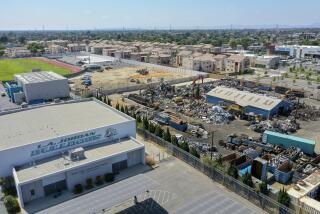Rockwell Pleads Guilty in Blast
- Share via
Rockwell International pleaded guilty in federal court Thursday to three felony counts of hazardous-waste mishandling, and cut a record $6.5-million check to the U.S. government to pay fines for the 1994 chemical explosion that killed two scientists at the firm’s open-air field lab near Simi Valley.
John Stocker, Rockwell’s legal vice president, stood before U.S. District Judge Mariana R. Pfaelzer and admitted that the firm’s Canoga Park-based Rocketdyne division had illegally stored and burned an exotic chemical called triaminoguanidine nitrate, or TAGN, at the Santa Susana Field Lab.
For the record:
12:00 a.m. April 13, 1996 For the Record
Los Angeles Times Saturday April 13, 1996 Valley Edition Metro Part B Page 2 Zones Desk 2 inches; 49 words Type of Material: Correction
Rocketdyne--An article Friday incorrectly reported the date and the identity of the state agency involved in a sanction against Rocketdyne that preceded this week’s guilty plea to federal charges in a fatal 1994 chemical blast. The earlier action came when Cal/EPA cited and fined Rocketdyne in 1992 for illegally burning hazardous waste in 1990.
Stocker said the firm would pay the U.S. Treasury a $6.5-million fine, the largest sum ever won in a hazardous-waste case in California, and the maximum penalty for two counts of illegal disposal and one count of illegal storage of hazardous wastes.
The far-reaching plea agreement grants Rockwell immunity from federal criminal charges in any case of illegal handling, disposal, generation, storage or transportation of hazardous wastes that may have occurred since 1991. But it does not shield the firm or its employees from state prosecution, and Ventura County prosecutors are considering filing charges.
Pfaelzer approved the agreement after attorneys provided a full briefing on the details.
Moments later, Stocker handed over to Assistant U.S. Atty. Nathan Hochman a $6.5-million check drawn on Rockwell International’s corporate account, for deposit in the U.S. Treasury’s general fund.
*
Under the agreement, Stocker also gave federal prosecutors the first of three thick reports on the company’s internal investigations of the July 26, 1994, explosion that killed physicists Otto K. Heiney, 53, and Larry A. Pugh, 51. While company officials had long insisted the men were running valid experiments to determine how easily TAGN could be shipped, they later admitted the scientists were burning the chemical to get rid of it.
Stocker declined to comment on the plea after Thursday’s hearing, as did Vince Marella, a private attorney specializing in white-collar criminal defense and hired by Rockwell to help engineer the plea.
But Dan Hirsch, an environmental watchdog who has often criticized Rocketdyne for the way the firm’s field lab handles dangerous substances ranging from plutonium to rocket fuel, immediately attacked the deal.
“I’m just furious with these guys,” said Hirsch, nodding his head toward where Assistant U.S. Atty. William Carter was talking to reporters. “I think they guaranteed that more people will die in the future by cutting a deal that will immunize [Rockwell] for cases that have already taken place.”
Fines of that size are no deterrent to a huge corporation such as Rockwell, said Hirsch, president of the Santa Monica-based Committee to Bridge the Gap.
Hirsch scoffed at the federal case that accused Rocketdyne of illegal disposal only on the two days that the firm admitted doing the burning--July 21 and 26, 1994.
After Cal/OSHA outlawed open burning of such hazardous wastes in 1990--a practice the company had engaged in for years--the agency caught Rocketdyne doing it again in 1992 and fined the firm, Hirsch pointed out. And after the 1994 explosion, Cal/OSHA leveled another $252,000 in fines against Rocketdyne.
“This [immunity] is a great deal for Rocketdyne,” Hirsch said.
But as prosecutors turn their investigation toward past and current Rocketdyne employees who may have ordered the illegal burning, U.S. Atty. Nora Manella sternly rejected Hirsch’s criticism.
Rockwell’s plea was “a very successful resolution to this case,” Manella said. The government filed charges on everything it could prove and won the maximum penalty allowed by law.
“You won’t find many cases in which a company has agreed to open up its files,” Manella added. “And you won’t find many in which this amount of money is paid, without any offer of immunity to individual employees or a global agreement that covers immunity to the company for civil liability as well as criminal.”
*
Carter, the lead prosecutor on the case, said Hirsch is ill-informed on the plea agreement and the evidence.
“This doesn’t preclude us from pursuing investigation or prosecution of any individuals,” he said of the deal. State prosecutors will very likely charge Rocketdyne for any crimes that would be shielded from prosecution by the federal deal, he said.
On learning of Rockwell’s guilty plea, Heiney’s widow, Judith Heiney, said, “I’m glad it’s winding down.
“It’s been a very long, arduous road, and it just doesn’t seem to be ever coming to an end,” she said. “I wish the entire process was completed. There are so many people affected by this that need to get on with their lives, and it’s difficult with all of this going on. It never should have happened.”
More to Read
Sign up for Essential California
The most important California stories and recommendations in your inbox every morning.
You may occasionally receive promotional content from the Los Angeles Times.













